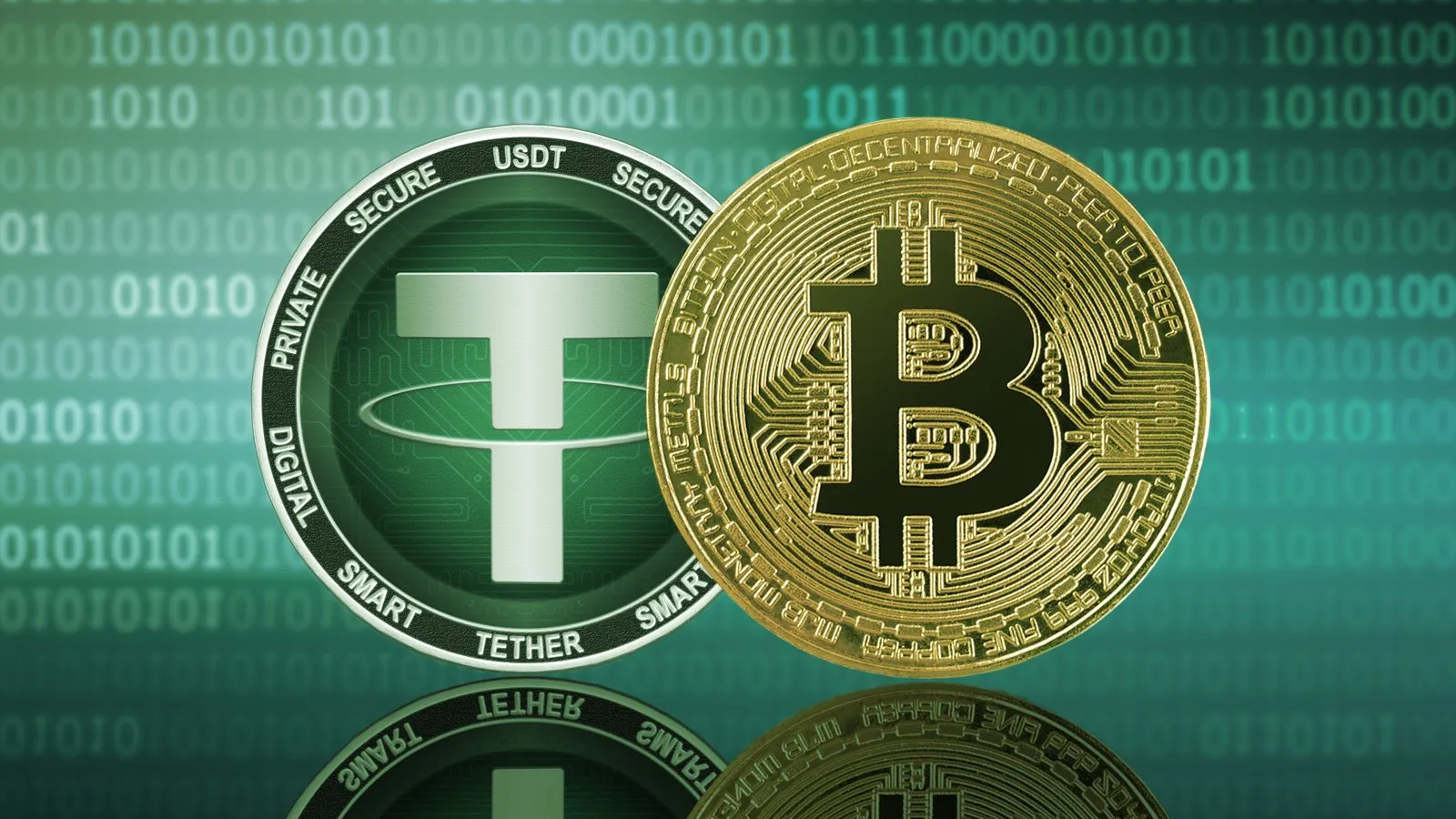Tether🧡#Bitcoin
Starting this month, Tether will regularly allocate up to 15% of its net realized operating profits towards purchasing Bitcoin. These Bitcoin shall be considered on top of the minimum reserves assets that 100% back tether tokens.
More 👉 https://t.co/7zC2swgwWH pic.twitter.com/BOcSDjjmDf
— Tether (@Tether_to) May 17, 2023
Coin Prices
BTC
$68,991.00
6.82%ETH
$2,065.73
11.35%XRP
$1.47
7.99%BNB
$629.52
6.94%USDC
$0.999903
-0.00%SOL
$88.75
13.35%TRX
$0.286128
1.32%DOGE
$0.103504
12.41%FIGR_HELOC
$1.034
-0.18%WBT
$51.59
6.62%ADA
$0.297218
13.70%BCH
$516.40
6.61%USDS
$0.999874
-0.01%LEO
$8.78
5.30%HYPE
$28.74
6.31%LINK
$9.39
13.90%XMR
$346.11
6.07%CC
$0.164245
1.73%USDE
$0.999388
0.05%XLM
$0.165583
9.67%RAIN
$0.00985135
4.25%USD1
$0.999982
-0.02%LTC
$57.96
12.21%HBAR
$0.103612
7.68%ZEC
$255.65
3.75%AVAX
$9.69
15.51%PYUSD
$1.00
0.01%SUI
$0.986779
13.64%SHIB
$0.0000064
7.94%TON
$1.34
1.98%CRO
$0.079274
6.26%WLFI
$0.116884
5.53%XAUT
$5,174.96
0.70%DOT
$1.56
25.04%UNI
$4.08
20.86%PAXG
$5,207.29
0.63%M
$1.36
-3.45%MNT
$0.624854
5.80%BUIDL
$1.00
0.00%AAVE
$122.72
6.57%PEPE
$0.00000434
10.38%TAO
$183.03
7.49%ASTER
$0.713739
2.84%USDF
$0.997462
-0.02%OKB
$78.38
6.24%SKY
$0.070731
8.98%USDG
$1.00
0.02%USYC
$1.12
0.00%PI
$0.171072
5.04%BGB
$2.25
2.28%RLUSD
$1.00
0.01%HTX
$0.00000166
1.06%NEAR
$1.16
18.87%ETC
$9.34
11.00%ONDO
$0.279975
11.70%ICP
$2.40
13.32%BFUSD
$0.999366
-0.04%POL
$0.116653
4.73%WLD
$0.429002
12.88%KCS
$8.95
8.13%USTB
$11.00
0.01%GT
$7.18
5.83%PUMP
$0.00191471
7.97%NIGHT
$0.061531
7.52%ATOM
$2.07
2.63%QNT
$66.51
6.15%HASH
$0.01747046
7.95%ENA
$0.10996
11.45%NEXO
$0.884712
6.71%KAS
$0.03165926
8.18%FLR
$0.00985902
7.91%TRUMP
$3.58
5.76%USDTB
$0.998066
-0.10%ALGO
$0.092598
9.81%FIL
$1.082
22.15%APT
$1.003
21.38%RENDER
$1.51
8.26%EUTBL
$1.24
0.21%USDD
$1.00
0.02%OUSG
$114.40
0.01%PIPPIN
$0.737121
-9.60%JAAA
$1.027
0.00%USDY
$1.11
-0.63%XDC
$0.03464979
3.63%VET
$0.00791789
9.91%MORPHO
$1.84
15.23%BDX
$0.080877
0.78%ARB
$0.102453
10.71%BONK
$0.00000654
11.78%JTRSY
$1.096
0.01%USD0
$0.996322
0.17%STABLE
$0.030292
4.87%GHO
$0.999988
0.01%JUP
$0.162455
12.25%A7A5
$0.01294477
0.05%STX
$0.27183
13.29%KITE
$0.274185
6.03%TUSD
$0.999124
0.02%DCR
$28.56
2.23%SEI
$0.071638
8.74%FTN
$1.087
-0.12%PENGU
$0.00747027
15.92%VIRTUAL
$0.710242
17.05%EURC
$1.18
0.32%USDAI
$0.999926
0.00%DASH
$35.71
8.04%CAKE
$1.33
10.24%XTZ
$0.399957
8.15%KAU
$167.52
0.95%ETHFI
$0.530003
6.21%JST
$0.04419415
-4.05%FET
$0.171023
10.21%FDUSD
$1.001
0.05%CRV
$0.258566
15.08%IP
$1.069
4.97%CTM
$0.085213
8.84%LIT
$1.49
3.70%CHZ
$0.03540505
3.58%AERO
$0.381387
14.13%GNO
$132.04
9.37%USX
$0.999743
-0.00%PRIME
$1.019
-0.13%BTT
$0.00000034
3.71%BSV
$16.72
9.64%INJ
$3.33
4.81%NFT
$0.00000033
0.63%KAIA
$0.056513
6.98%TIA
$0.363869
20.32%ZRO
$1.58
4.80%PYTH
$0.055343
8.35%SUN
$0.01656862
0.98%ADI
$3.20
1.28%SPX
$0.332814
14.36%IOTA
$0.071756
8.52%GRT
$0.02842547
8.79%FLOKI
$0.00003145
11.70%JASMY
$0.00602762
8.64%CRVUSD
$0.995644
0.11%LDO
$0.332747
11.06%OHM
$17.54
2.92%FRAX
$0.99122
-0.07%CFX
$0.052759
8.63%OP
$0.126058
7.59%2Z
$0.077001
10.55%TEL
$0.00279024
10.33%HNT
$1.42
-3.30%BTSE
$1.61
-2.07%SYRUP
$0.224619
11.30%ENS
$6.73
9.57%STRK
$0.04601998
10.43%SIREN
$0.339294
0.76%AB
$0.00249335
0.47%H
$0.134812
-1.16%SAND
$0.089626
13.45%AXS
$1.38
10.99%MON
$0.02148628
4.27%XPL
$0.103741
18.65%NUSD
$0.996591
-0.15%WIF
$0.221404
11.63%UDS
$1.78
5.53%YLDS
$0.999999
0.00%TWT
$0.523892
4.87%USDA
$0.985992
-0.25%PENDLE
$1.30
9.37%ZBCN
$0.00221221
6.29%AUSD
$0.999889
0.03%USTBL
$1.075
0.01%BCAP
$22.79
0.00%LUNC
$0.00003694
5.90%BORG
$0.204801
6.26%APEPE
$0.00000096
0.45%NEO
$2.84
8.88%FT
$0.097721
-0.89%ULTIMA
$5,287.95
0.01%THETA
$0.199307
7.50%POWER
$0.934733
70.95%VSN
$0.054068
4.64%TIBBIR
$0.194277
15.74%MANA
$0.100048
9.93%ZK
$0.0205506
6.68%PC0000031
$1.00
0.00%BAT
$0.126165
8.40%XCN
$0.00502526
5.63%FF
$0.0798
-0.00%VVV
$4.21
13.61%GALA
$0.00390089
10.61%COMP
$19.01
6.08%CVX
$1.99
14.73%FDIT
$1.00
0.00%REAL
$0.055694
9.93%BARD
$0.772263
-0.45%RAY
$0.646107
9.59%WFI
$2.16
3.59%FLUID
$2.17
10.77%IUSD
$0.998805
-0.10%FARTCOIN
$0.169471
14.92%RIVER
$8.61
-5.75%SENT
$0.0232697
0.19%MX
$1.81
1.11%S
$0.04365346
9.42%9BIT
$0.01998657
-0.26%KOGE
$48.01
0.03%XEC
$0.00000809
8.13%DEXE
$3.36
-6.12%EURS
$1.26
0.43%GLM
$0.15478
3.91%TRAC
$0.340789
10.10%IMX
$0.178077
12.17%GUSD
$0.998531
0.02%USDF
$0.998684
0.02%RUNE
$0.423014
9.27%THBILL
$1.013
-0.04%WEMIX
$0.305822
0.23%0G
$0.659158
3.40%SATUSD
$0.881312
-11.40%EGLD
$4.72
10.94%1INCH
$0.097854
11.87%B
$0.137354
11.34%A
$0.084215
8.39%BERA
$0.627239
4.78%SFP
$0.266939
6.49%SKR
$0.02325866
-6.43%JTO
$0.300171
6.62%WAL
$0.081521
11.58%RLB
$0.075365
1.92%COCO
$0.130543
5.43%ACRED
$1,097.90
0.03%MWC
$11.51
-5.05%KTA
$0.261758
6.33%GOMINING
$0.318791
-0.22%SNX
$0.376151
0.07%AMP
$0.00150945
3.38%COW
$0.225616
2.99%LION
$0.00407967
3.91%OZO
$0.131719
0.84%AR
$1.89
0.96%DOLA
$0.995478
0.02%LPT
$2.43
8.23%EIGEN
$0.202178
8.19%PUSD
$1.001
0.00%BMX
$0.343607
4.55%ZANO
$7.62
-12.04%QRL
$1.45
0.81%FRXUSD
$1.00
0.03%REUSD
$1.061
-0.07%CASH
$0.999842
-0.02%CUSD
$0.995632
-3.22%GRX
$11.65
-2.38%
